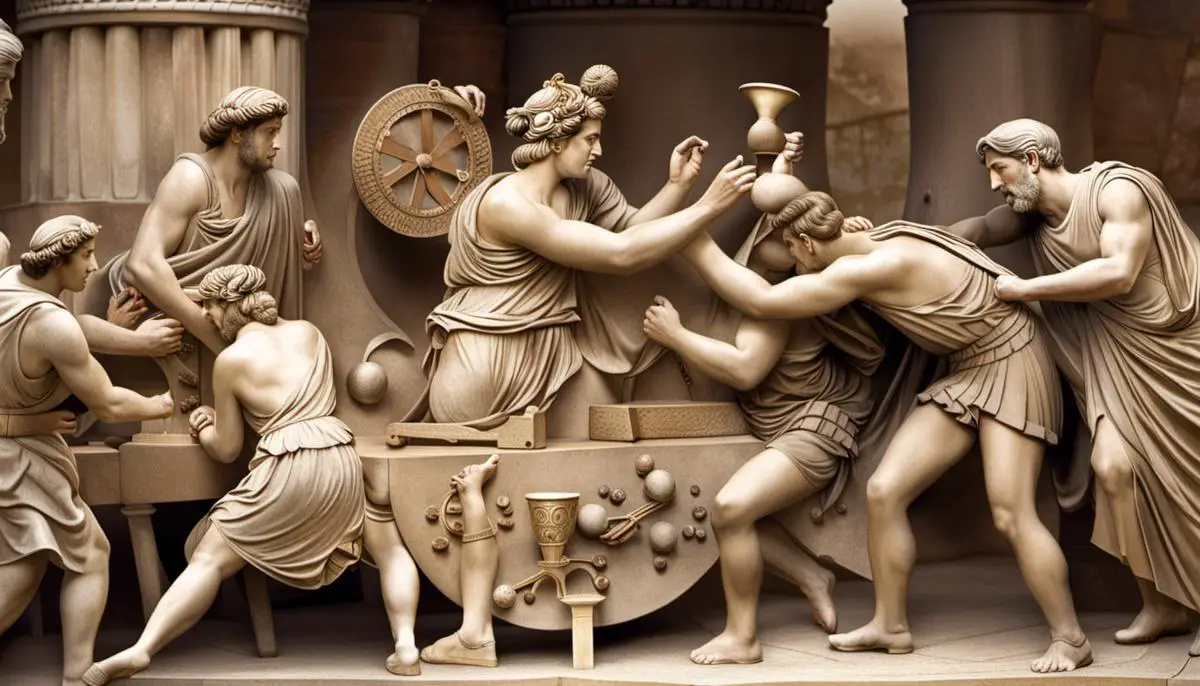In the pantheon of entertainment and leisure, the origins and evolution of board games have their roots deeply embedded in ancient civilizations, with a particularly significant contribution coming from ancient Greece. The engaging world of ancient Greek games has left an indelible mark on the pantheon of today’s board games. An in-depth exploration into this historical treasure trove reveals fascinating insights into petteia, latrunculi, and knucklebones, among others, drawing attention to their intriguing mechanics, historical significance, and social importance. Yet, their impact does not cease with their deep historical roots alone, but extends to influence the transition and evolution of games through various eras, reshaping their design and structure, and ultimately impacting modern board games in profound ways.
Overview of Ancient Greek Games
Ancient Greek Games and their Characteristics
The ancient Greeks were fond of intellectual stimulation and physical challenges, which were often expressed through various types of games. Some of the most prominent included petteia, latrunculi, and knucklebones. Petteia, often referred to as the game of pebbles, was documented in many ancient Greek writings and is believed to be similar to present-day chess or checkers. Latrunculi, on the other hand, was a strategic board game played with pieces that varied in size and was liked among soldiers. Knucklebones, often termed astragaloi, involved the throwing of animal knuckles and was popular among children.
In understanding their societal significance, games occupied a pivotal role in the cultural context of ancient Greece. They were part of religious festivals, school curriculum, social gatherings, and oftentimes battles, pointing to their ubiquitous role in shaping the ancient Greek civilization.
Game Mechanics
The mechanics of playing these games, while relatively simple, were marked by their strategic nature. Petteia, for instance, was played on a grid-like board with two players alternating moves, with the objective being the capturing of the opponent’s pieces. Latrunculi, also a two-player game, involved maneuvering one’s pieces in a way that trapped or cornered the opponent’s pieces. Knucklebones was a game of chance where players cast bones, similar to modern dice, and points were assigned based on the manner in which the bones fell.
Influence on Modern Board Games
Interestingly, ancient Greek games have left a considerable influence on modern board games. For instance, the concept of opposing sides with different pieces on a grid-like board observed in petteia has clear similarities with popular games like chess and checkers. The strategic planning and tactical outcomes in latrunculi can be seen in war or conflict-based games like Risk or Stratego.
On a broader scope, the ancient Greeks’ emphasis on strategy, adversarial conflict, and intellectually engaging gameplay continues to be an underlying foundation of contemporary board games, from classics like Monopoly to newer iterations like Settlers of Catan.
Even knucklebones, a game of chance, has its echoes in many current dice-driven board games. Not only in terms of the mechanism, but also in the broader philosophical understanding of games as tools for learning chance, uncertainty, and decision-making skills.
Gameplay as a Reflection of Culture
The influence of ancient Greek games often goes unnoticed, yet it is deeply embedded in the strategies and values they promoted. These games were a product of a culture that valued intellectual dexterity, foresighted planning, and fierce competition, demonstrating a clear reflection of the society’s values.
These principles have persisted over centuries and subtly woven into the design and gameplay dynamics of modern board games. Whether it’s the risky bets in Poker, or empire building in games like Civilization, the echoing influences of ancient Greek ideologies are palpable in our gaming world today.
The seemingly simple games of ancient Greece have deeply impacted modern board gaming, transforming them not just into recreational activities, but into significant forms of expressing human experiences and marking cultural progress.
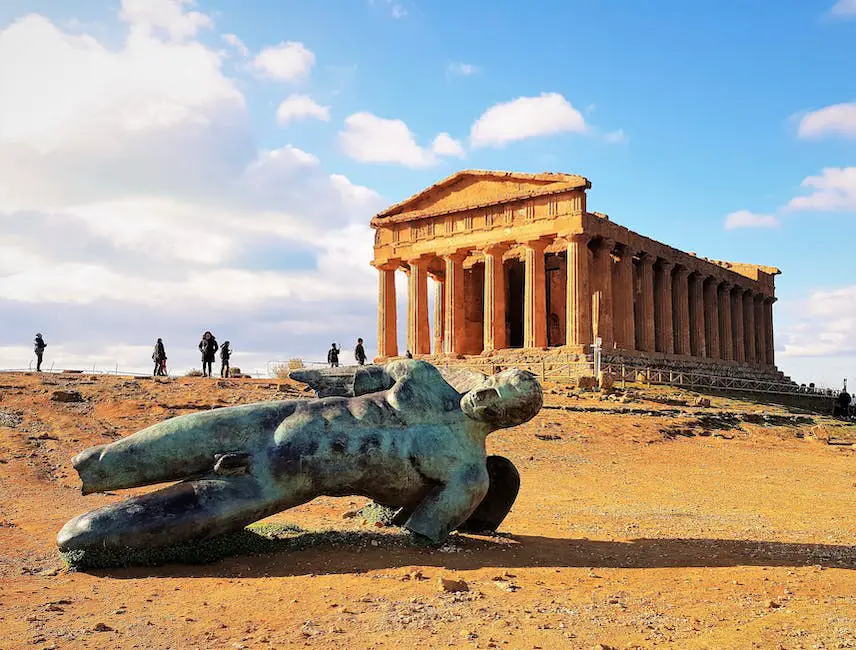
Transition and Evolution of Games Through the Ages
Origins of Ancient Greek Games
The ancient Greeks, famously known as the creators of theater, philosophy, and the olympics, have also left a significant mark on the field of board games. They created a culture where gameplay was intellectual, stimulated strategic thinking, and encouraged complex planning. Some well-known games dating back to this era include Petteia, a game similar to checkers, Kottabos, a widely enjoyed dinner party game, and Pessoi, an early precursor to chess.
Petteia: A Game of Tactics
Petteia, a tactically challenging game from ancient Greece, shares striking similarities with modern board games. It was played on a grid and the main objective was to capture the opponent’s pieces by sandwiching them much like the modern game of Othello. This emphasis on strategy, opposed to chance, is a direct influence on current games where players have to think critically and strategically to ensure success.
Kottabos: The Origins of Social Games
Kottabos was a popular social game played at Greek dinner parties—symposiums. In the Kottabos, players would fling wine lees at targets with the goal being to knock them down. Modern fun board games and party games often incorporate similar elements of enjoyable competition, dexterity, and social interaction.
Pessoi: The Early Version of Chess
Pessoi, a game resembling checkers, was known for its strategic and thought-provoking nature. It demanded tactical thinking and foresight—just like modern chess. This game undoubtedly has influenced games like chess and draughts—both of which require intricate strategies for success.
Greek Influence in Modern Board Games
Today’s board games owe much to their ancient Greek predecessors. Modern strategy games like chess and Risk involve careful planning and tactical decisions, similar to Petteia and Pessoi. Similarly, social games owe their premise to the likes of Kottabos, emphasizing interaction and amusement.
The Transition and Endurance of Greek Games
Transitioning from ancients to medieval times and subsequently to the Enlightenment era, the evolution of Greek games has been an intriguing progression. Early Greek games were adapted by the Romans who introduced them to numerous regions across the globe. Over centuries, these games have evolved and adapted to cultural shifts, exhibiting the enduring influence of Greek game concepts. Elements such as strategy, intellect, and social engagement, which were integral to Greek games, have persisted and continue to dominate the landscape of modern board games.
The profound influence that ancient Greek games have exerted on modern board games is intriguing. Taking a closer look at this legacy enables us to appreciate deeply the process of evolution and cultural exchange found in today’s gaming world—a world that connects individuals worldwide through strategic rivalry and mutual enjoyment.
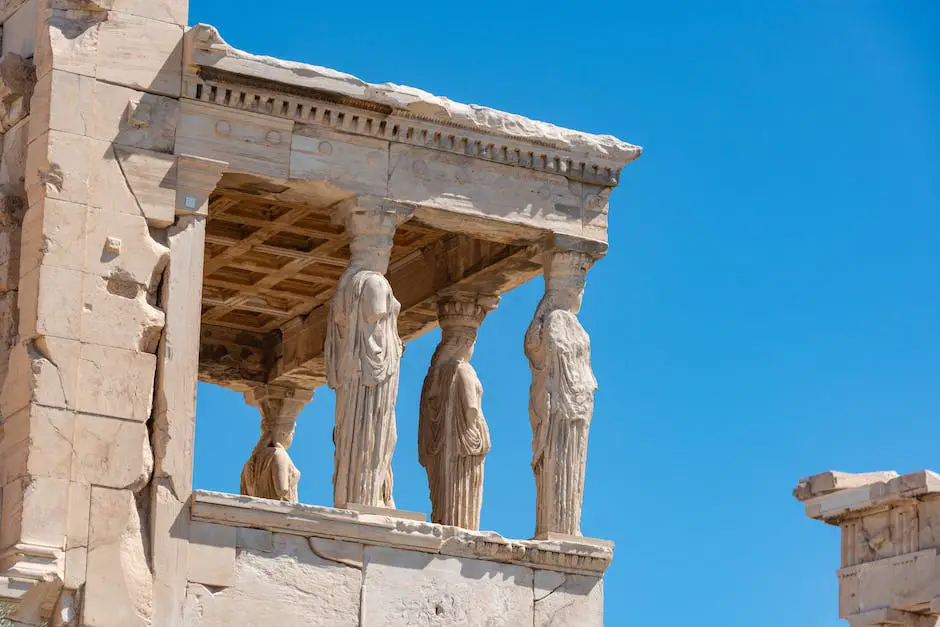
Specific Parallels Between Ancient Greek and Modern Board Games
The Path from Petteia to Chess
Many modern board games have borrowed extensively from ancient Greek games—be it in terms of rules, gameplay, or themes. A standout example of this cultural borrowing can be seen in the relationship between petteia, a board game popular in ancient Greece, and today’s chess. Both games center around strategic manoeuvres, calls for foresight, and the moving of pieces on a grid with a view to trapping the opponent’s game piece. Petteia, with its roots in military strategy, bears striking similarities to a simplified form of chess, hence giving us a glimpse of how the ancient Greek game could have contributed to the formation of modern-day chess.
Chasing and Racing Games: A Shared Theme
Certain thematic elements seen in ancient Greek games have seamlessly transitioned into modern board games. This is particularly evident in racing and chasing games. Greek games often featured a ‘race to the end’ mechanic, seen in games like ephedrismos, where players raced to be the first to reach a certain point. This mechanic has become a staple in many modern board games like Sorry or Parcheesi. Similarly, games of chase, where the goal is for one player to catch the other, present in games like kubinda, appear in modern games like tag or hide-and-seek.
Symbolism and Storytelling: The Legacy of Greek Mythology
One of the defining aspects of ancient Greek board games was their connection to mythology and storytelling. For example, many Greek games were infused with tales from the Iliad and the Odyssey, or associated with Greek gods and heroes. This tradition of incorporating mythological and story elements into games is alive and well in modern board gaming. Fantasy Flight’s “Cyclades” and “Hades” or board games like “Santorini” incorporate Greek mythology into their game themes and mechanics.
Linear A and B: The Birth of Narrative Games
Ancient Greek games also paved the way for the development of narrative games, where the progression of the game follows a storyline. The Linear A and B script, used in Greek games, serialized a narrative in their game. This influence can be seen in games like Dungeons & Dragons or Gloomhaven where gameplay unfolds according to a preset storyline.
From Pills to Pawns: The Evolution of Game Elements
One popular game piece in ancient Greece was the astragalus, similar to what we now know as dice. Not just a simple object, but a bridge connecting the past and the present, the astragalus offers insight into the foundation of our current game mechanics. The Greeks had another comparable element too: small figurines or tokens that acted as playing pieces, quite like what we see in modern games. These timeless components were mirrors of their own society and culture but unknowingly laid the groundwork for what now stands as pillars in today’s board games.
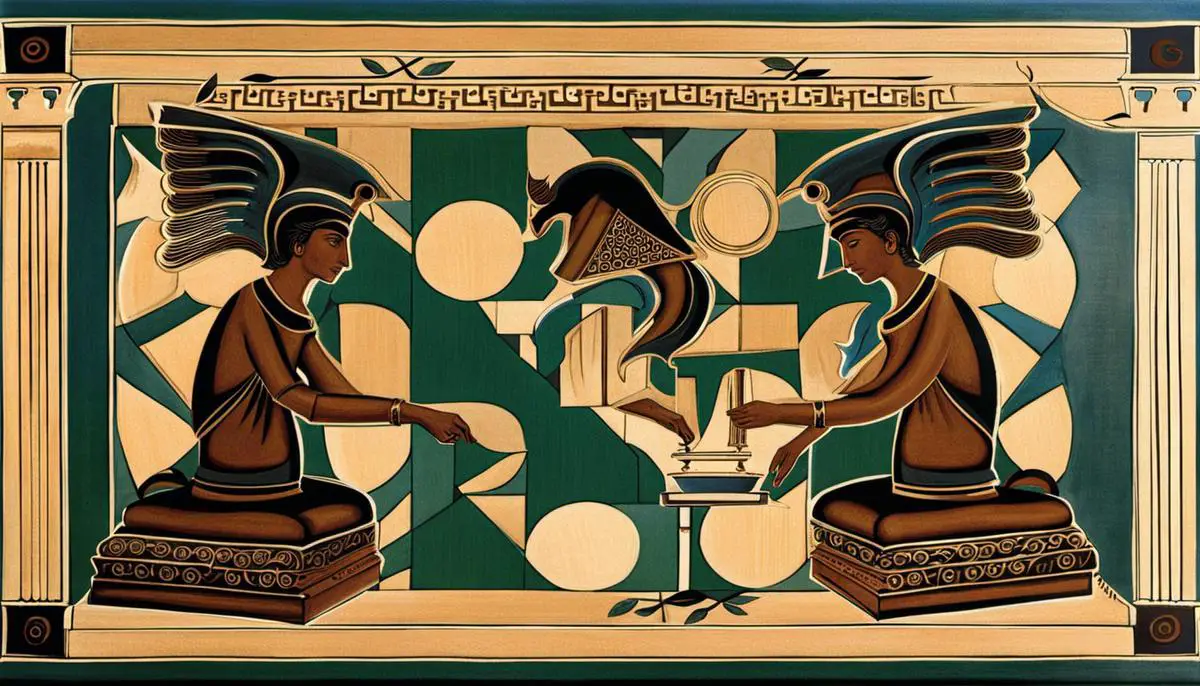
The Influence and Significance in Modern Game Design
Enticing Strategies: The Greek Formula in Modern Games
Most Ancient Greek games pivoted on strategy. Crafted to challenge the mind, they examined one’s knack for calculated planning and ability to tactically manoeuvre their way to win. Petteia (similar to the game of checkers we play today), Polis, and Polemos were few of the games that somewhat fathered our current lot of board games. Especially noteworthy was Petteia for its focus on strategy, which involved ensnaring or capturing an opponent’s pieces. This fundamental essence still thrives in our current strategic board games such as Chess, Checkers, and even Monopoly, where dominating territories and blocking adversaries form an integral aspect of the play.
Translating Simple Rules to Fun Gameplay
One of the key aspects of ancient Greek games that has influenced modern board games is the convention of simple rules that nonetheless encourage complex strategies. With clarity and simplicity in game rules, players can focus more on developing tactics and strategies, allowing for highly engaging and competitive games. Essentially the same concept is now applied in modern board games, resulting in a balance between simplicity and complexity that many of today’s gamers find enjoyable and compelling.
The Influence of Abstract Strategy
Abstract strategy games were a significant part of ancient Greek gaming culture. These games, such as three-men’s Morris and Petteia, required no luck or randomness and solely rely on player strategy. The influence of this game design philosophy is especially evident in numerous modern strategy board games today. Chess, arguably the most well-known strategy game globally, echoes this design, where planning, foresight, and strategies are the key factors to winning.
Emergence of Social Interaction and Diplomacy
With ancient games like Kottabos, where players threw wine at targets in competitive spirit, the Greek culture had a sense of social interaction and diplomacy in gaming that we can see reflected in modern board games. These social games often encourage dialogue, engagement, and interaction among players. Modern variants like Ticket to Ride, The Resistance, or Settlers of Catan have undoubtedly been influenced by this aspect, integrating diplomacy and communication skills as an essential part of the gameplay.
The Importance of Resource Management
Many ancient Greek games also revolved around resource management, which required players to utilize their resources effectively for victory. For example, in the game of Latrunculi, players had to manage their pieces and plan their moves carefully to capture opposing pieces and control the board. This idea has been carried through to a variety of modern board games, like Settlers of Catan and Agricola, where efficient management of resources is a critical factor for success.
In conclusion, the influence of ancient Greek games on modern board games is immense, providing the building blocks for fundamental game mechanics that have stood the test of time. Each of these core elements from the ancient games – strategy, simplicity, abstraction, social interaction and resource management -continues to be a guiding principle in the design of contemporary board games, affirming the enduring relevance of ancient Greek games’ ideas and philosophies.
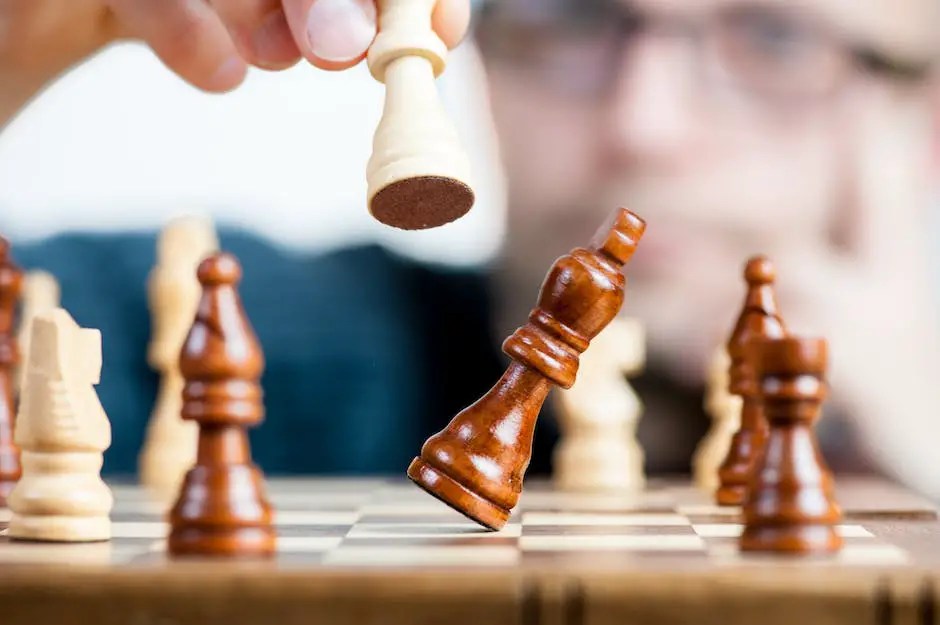
The intricate details and strategic complexities honed by ancient Greek games serve as an enduring source of inspiration for modern board game design. These foundational elements, defined by their simplicity or complexity, strategic potential, and cultural significance, continue to echo in modern board games, shaping our understanding and appreciation of this form of entertainment. By realizing the lasting influence of games like petteia, latrunculi, and knucklebones, we not only gain a richer comprehension of our gaming history but also obtain insights into the future trajectory of board game design. Thus, exploring the influential thread of ancient Greek games runs the gamut from historical appreciation to foreseeing the evolution of modern board gaming.
Frequently Asked Questions: Influence of Ancient Greek Games on Modern Board Games
A: Ancient Greek games have influenced modern board games by shaping gameplay mechanics, strategic thinking, and thematic elements.
A: Yes, ancient Greek games served as a foundation for game design principles, inspiring mechanics like movement, capturing, and strategic planning.
A: While direct adaptations are less common, some modern games draw inspiration from ancient Greek concepts, capturing the essence of their gameplay.
A: Ancient Greek games required players to think strategically, anticipate opponents’ moves, and make tactical decisions—skills that remain crucial in modern board games.
A: Skills such as critical thinking, spatial awareness, and adapting strategies to opponents’ actions—developed in ancient games—are valued in modern gameplay.
A: Yes, ancient Greek themes and stories have influenced modern board games, contributing to diverse themes that resonate with players worldwide.
A: While few games replicate ancient gameplay exactly, modern games often incorporate elements like grid movement and capturing from ancient Greek games.
A: Enthusiasts can explore modern board games with ancient Greek themes or strategic mechanics that echo the challenges faced in ancient gameplay.
A: Games like Petteia, Knucklebones, and Latrunculi influenced gameplay principles and strategies found in modern board games.
A: Yes, exploring ancient Greek games offers insights into history, culture, and how entertainment and strategy intertwined in ancient societies.
A: Enthusiasts can research historical texts, archaeological findings, and modern analyses to understand the evolution of gaming from ancient times to today.
